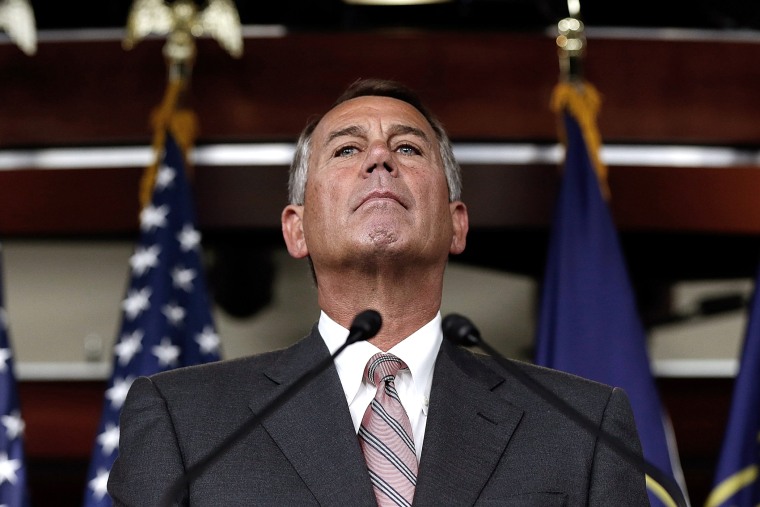Immigration reform: surprisingly not dead!
That's the message top House Republicans are sending as the new year kicks off. Speaker John Boehner is working with his caucus this month on a set of "principles" that will guide them in crafting a legislative response to the bipartisan Senate bill that passed long ago. In a very heartening sign for immigration activists, House Judiciary Chair Bob Goodlatte -- the caucus' point man on the issue -- suggested to Telemundo on Friday that these principles could include some kind of legalization program for the nation's undocumented immigrants. That would be a breakthrough for a caucus that has yet to reach consensus on whether to abandon "self-deportation" as their default approach.
"There's an acknoweldgement that it won't be immigration reform if they don't deal with the 11 million immigrants who desire to be Americans," Lynn Tramonte, deputy directory of pro-reform group America's Voice, told reporters in a conference call Friday. "That's a huge victory."
Just two months ago, reformers were starting to despair as prospects for reform appeared to hit a low point. But in early December, Boehner surprised immigration activists by hiring former John McCain aide Becky Tallent, a well regarded immigration wonk, to advise him on policy. Then he got into an ugly feud with conservative advocacy groups over the budget, raising hopes that he might resist their objections and tackle the thornier issues surrounding immigration legislation as well.
"My own view is I think they really want to do this," said Simon Rosenberg, founder of the New Democrat Network. "There are a million indicators...they are taking this seriously."
But once House Republicans move forward with an actual legislative outline, that's only the beginning of the process. The next step will be to try and find common ground with the Senate's ambitious proposal. One of the most contentious areas is the Senate's plan for a pathway to citizenship for undocumented immigrants. Few expect the House to follow suit with a pathway map of its own.
"I have no idea what's in the document, but what I'm hearing is more and more people warming to this notion of legal status that stops short of citizenship," Tamar Jacoby, president of the business-focused ImmigrationWorks USA, told msnbc.
Goodlatte and others have hinted that they may be open to legalizing immigrants on a provisional basis but letting them apply for a green card and citizenship only through existing channels -- marriage to a citizen, say, or through family visas. That would likely leave major swaths of immigrants stuck without citizenship for decades. But for immigrants currently living in constant fear of deporation, it could be a tempting compromise.
Rosenberg suggested Republicans could be more flexible than many expect on the issue once they make the initial break from the hard right on letting immigrants stay.
"We've obviously been very focused on citizenship, but for the Republicans and the anti-immigration groups on their side the big issue is legalizaiton," he said.
Nonetheless, Rosenberg added that a version of Goodlatte's compromise suggestion, if paired with a strong and immediate legalization program, "is not an unreasonable idea."
There are plenty of other potential mines as well. Republicans have been considering an interior enforcement bill that would put now-struggling state laws in places like Arizona and Alabama designed to kick out migrants on sounder legal footing. Goodlatte also mentioned that legalization might be tied to some kind of trigger, like implementation of new security measures, an idea that immigration groups would likely reject out of hand. But House Republicans have definitely gotten the attention of reformers.
"I think most people in the Republican conference recognize they have to step up to the plate with something," Jacoby said.
